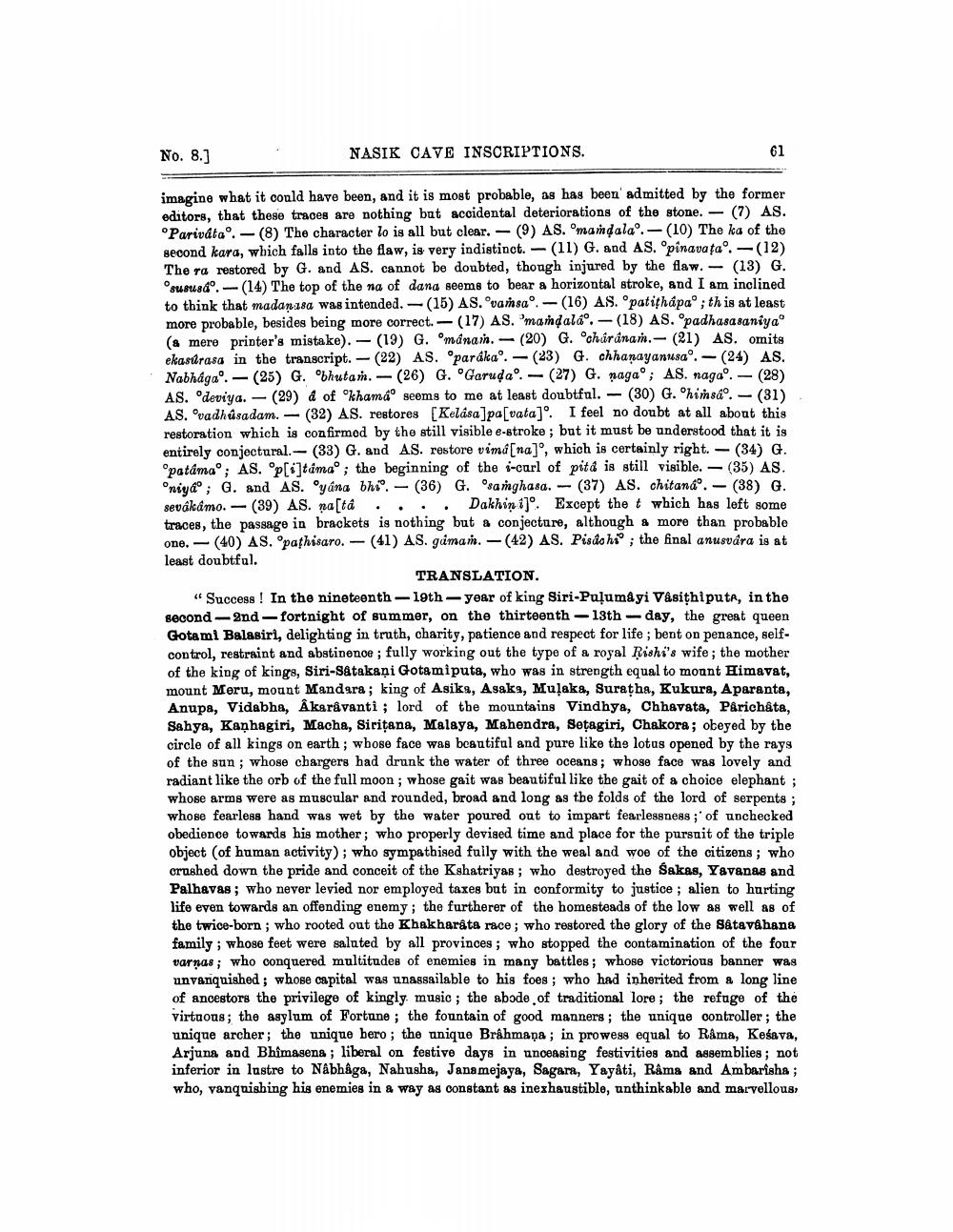________________
No. 8.]
NASIK CAVE INSCRIPTIONS.
imagine what it could have been, and it is most probable, as has been admitted by the former editors, that these traces are nothing but accidental deteriorations of the stone. - (7) AS.
Parivata. -(8) The character lo is all but clear. - (9) AS. Omandala. -(10) The ka of the second kara, which falls into the flaw, is very indistinct. - (11) G. and AS. Opinavata. -(12) The ra restored by G. and AS. cannot be doubted, though injured by the flaw. - (13) G.
susurdo.-(14) The top of the na of dana seems to bear a horizontal stroke, and I am inclined to think that madan18a was intended. -(15) AS. Ovaṁsao. -(16) AS. patithapao; th is at least more probable, besides being more correct. - (17) AS. "mandala. -(18) AS. Opadhasasaniyao (& mere printer's mistake). - (19) G. Omanan. - (20) G. Ochúránan.-(21) AS. omits ekasurasa in the transcript. -(22) AS. oparáka'. -(23) G. chhanayanusa. -(24) AS. Nabhága. -(25) G. "bhutam. - (26) G. Garuda. -(27) G. pagao; AS. naga. -(28) AS. "deviya. -(29) d of "khamdseems to me at least doubtful. - (30) G. hims&o. - (31) AS. Cvadhúsadam. - (32) AS. restores [Kelása]pa[vata]". I feel no doubt at all about this restoration which is confirmed by the still visible e-stroke; but it must be understood that it is entirely conjectural. - (33) G. and AS. restore vima [na]', which is certainly right. - (34) G. Opatámao; AS. P[i]támao; the beginning of the s-curl of pita is still visible. - (35) AS. niyao; G. and AS. yana bhio. - (36) G. Osa nghasa. - (37) AS. chitando. - (38) G. sevakamo. - (39) AS. nasta . .. . Dakhin ijo. Except the t which has left some traces, the passage in brackets is nothing but a conjecture, although a more than probable one. — (40) AS. Opathisaro. -(41) AS. gúman.-(42) AS. Pisdo hi°; the final anusvára is at least doubtful.
TRANSLATION. “Success! In the nineteenth - 19th-year of king Siri-Puļumayi Våsithiputa, in the second-and-fortnight of summer, on the thirteenth - 13th day, the great queen Gotami Balasiri, delighting in truth, charity, patience and respect for life ; bent on penance, selfcontrol, restraint and abstinence; fully working out the type of a royal Rishi's wife; the mother of the king of kings, Siri-Satakani Gotamiputa, who was in strength equal to mount Himavat, mount Meru, mount Mandara; king of Asika, Asaka, Mulaka, Suratha, Kukura, Aparanta, Anupa, Vidabha, Åkarå vanti ; lord of the mountains Vindhya, Chhavata, Parichâta, Sahya, Kaņhagiri, Macha, Siritana, Malaya, Mahendra, Setagiri, Chakora; obeyed by the circle of all kings on earth ; wbose face was beautiful and pure like the lotus opened by the rays of the sun ; whose chargers had drunk the water of three oceans; whose face was lovely and radiant like the orb of the full moon; whose gait was beautiful like the gait of a choice elephant ; whose arms were as muscular and rounded, broad and long as the folds of the lord of serpents; whose fearless hand was wet by the water poured out to impart fearlessness ;' of unchecked obedience towards his mother; who properly devised time and place for the pursuit of the triple object of human activity); who sympathised fully with the weal and woe of the citizens; who crushed down the pride and conceit of the Kshatriyas ; who destroyed the sakas, Yavanas and Palhavas; who never levied nor employed taxes but in conformity to justice ; alien to hurting life even towards an offending enemy; the furtherer of the homesteads of the low as well as of the twice-born ; who rooted out the Khakharata race; who restored the glory of the Satavahana family; whose feet were saluted by all provinces; who stopped the contamination of the four varnas ; who conquered multitudes of enemies in many battles; whose victorious banner was unvanquished; whose capital was unassailable to his foes; who had inherited from a long line of ancestors the privilege of kingly music , the abode of traditional lore; the refuge of the virtuous; the asylum of Fortune ; the fountain of good manners; the unique controller; the unique archer; the unique bero; the unique Brahmaņa; in prowess equal to Råma, Keśava, Arjuna and Bhimasens ; liberal on festive days in unceasing festivities and assemblies; not inferior in lustre to Nábhága, Nahusha, Janamejaya, Sagara, Yayati, Rama and Ambarisha ; who, vanquishing his enemies in a way as constant as inexhaustible, unthinkable and marvellous,




